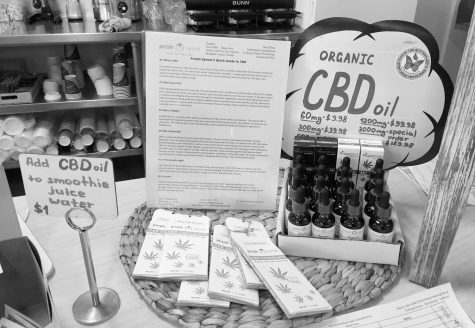Newly legalized drug extract gains popularity

When his favorite Instagram influencer posted about her use of cannabidiol, also known as known as CBD, senior Nick Maris felt compelled to try it. Since then, Maris has explored the use of CBD teas, skin care products and lotions.
“[The influencer] was drinking [CBD tea], and I was like, ‘I’m friends with this person,’ so I was like, ‘I should try this out,’” Maris said.
CBD is a compound that can be extracted from the marijuana plant and the hemp plant, which are both grouped in the cannabis species. Hemp-derived CBD contains less than 0.3 percent tetrahydrocannabinol, also known as THC, the psychoactive part of the plant. Legal CBD, unlike marijuana, is non-intoxicating.
In an email exchange, Marcel Bonn-Miller, adjunct assistant professor of psychology in psychiatry at the University of Pennsylvania Perelman School of Medicine, said CBD products may contain THC, so a person using CBD regularly could potentially test positive on a drug test.
“A lot of the products that are out there contain more than just CBD, even if CBD is the only thing listed on the label,” said Bonn-Miller. “When one extracts CBD, there’s other stuff in the plant, like THC, that ends up getting in the final product, so it’s pretty hard to find pure CBD. In a recent study, we found that 21 percent of CBD products have THC in them. In fact, we detected THC concentrations up to 6.43 mg/mL, which is a lot, so it’s important to know going in that you might get some THC in your product. CBD by itself doesn’t get you high, but if you also have some THC in there, it could.”
Before using CBD products on a regular basis, experts recommend speaking to a doctor.
“CBD interacts with a number of medications that people take for anxiety, depression or even seizures,” said Bonn-Miller. “Taking CBD along with those medications can, in some cases, lead to greater levels of them in your body. It’s important to talk to your doctor or pharmacist before you start taking CBD on a regular basis.”
The Industrial Hemp Bill, recently enacted on Aug. 26, 2018, legalized hemp-sourced CBD in Illinois. On Dec. 20, 2018, President Donald Trump signed the 2018 Farm Bill into law, which legalizes the cultivation, possession and distribution of hemp-based CBD oil. Per the passing of the federal law, the U.S. Drug Enforcement Agency, also known as the DEA, does not classify most CBD oils made with hemp as illegal.
“If [CBD oil contains] 0.31 percent [THC], then it’s legally defined as marijuana and absolutely still is a Schedule 1 controlled substance,” said Wade Sparks, special agent for the DEA, in a phone interview. “If it’s coming from the hemp plant and it’s below 0.3 [percent], it’s not under DEA regulation at all, so we have nothing to do with it any more than we would have to do with corn or sunflower seeds. Like, it’s completely removed from the Controlled Substances Act.”
With no legal consequences, Maris said he feels comfortable using CBD products as they have helped him cope with stress.
“I really like [using CBD] after a stressful day [so I can] go to bed because it just eases my nerves.
“It’s like a warm blanket,” Maris said.

